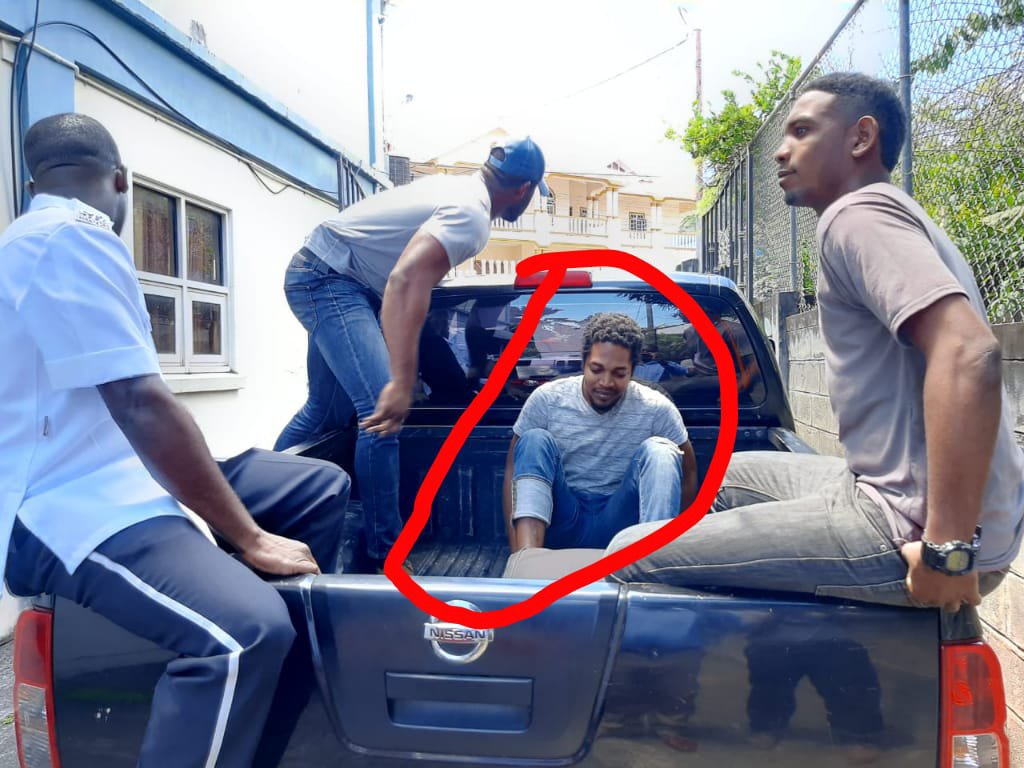
Mystery surrounds what transpired at the Argyle International Airport on July 28, 2019 when Jamaican Novian Travis Vaughn Mullings was arrested while supposedly attempting to leave the island with 30.85lbs of cannabis with intent to supply. Such was the crux of defense attorney Grant Connell’s summation as he presented his final review of the evidence brought before Chief Magistrate Rechanne Browne at Kingstown’s Serious Offenses Court.
The burden of proof beyond a reasonable doubt was the standard Senior Prosecutor Adolphus Delplesche had to, and according to the Court did, satisfy in order to secure a conviction. While campaigning for the 12 month sentence that was the ultimate penalty meted out to the 30 years old Jamaican mechanic, the Senior Prosecutor pointed out to the Court the evidence that established a substance contained in “this suitcase” was tested and proven to be a controlled drug contrary to Vincentian antidrug laws.
To his mind, the question that had to be convincingly answered as prescribed by the applicable laws was, “who was in possession of this suitcase that contained what was tested and proven to be a controlled drug, who had possession of this?”
Delplesche reminded the Court of the precepts enshrined in the legal definition of possession. He said, “we all know the law on possession I would not belabor it.
“Knowledge of what you have and control or custody of what you have.”
Delplesche and his team relied on “electronic evidence” which showed the defendant arriving at the Argyle International Airport and subsequently checking in with a black suitcase. Several witnesses, namely junior airport staff and police officer, also gave testimony on behalf of the State.
Notably absent from those called were the shift supervisor Cosmos George and head of airport security Keith Miller; a refrain Grant Connell zeroed in on throughout the latter part of the trial.
Connell was not satisfied with the State’s presentation of the facts beyond a reasonable doubt. To the lawman, the only evidence tying his client to the suitcase in question was dubious video footage from the AIA’s security cameras and the removable, he argued, baggage claim tag that was attached to the suitcase on which Mullings’ name and boarding pass number was affixed.
Connell contended that the inability to see close ups of either Mullings or the luggage he eventually checked in; and what happened with that suitcase “beyond the curtain” that screens the airport security operations from public view, loomed large enough to cast more than an ample shadow of doubt on the prosecution’s case.
He took some issue with the fact that “Miller failed and/or refused to release the videos to show what happened between check-in and trolley.”
According to Connell, the video evidence presented in Court from four cameras showed “Mullings coming from a car outside the airport pulling a black suitcase, him in an open area at the AIA as far as I can see walking towards a desk … the third one, he’s escorted by 2 police on the Southern side of AIA towards the security area and that was it.
“The video evidence that was tendered in this Honorable Court is tenuous to the point that it could not even narrow in on 1) the defendant, 2) the suitcase – to see if that suitcase that Mullings had, had any identification marks that we can create a nexus between the suitcase he had when he came into the airport and the one that was shown to him in the back.
“It’s interesting to note that of the evidence the prosecution put forward – there are cameras everywhere by LIAT, in the back where the bags are checked [and] by security….
“Douglas requested the assistance of the Head of Security Mr. Keith Miller who selected – Mr. Keith Miller, the Court must know, was the occupier of the Commissioner of Police chair for many years.
“Knowing the nature of this offense, failed and/or refused to present videos … of the journey of a suitcase that the prosecution alleges was in his possession.
“No camera evidence was shown beyond the curtains of the check-in point. As soon as the suitcase, they allege was in his possession, went beyond where the public could see, that’s it. It’s as if it disappeared into thin air.
“Conveyor belt video? None. Security video? None. Video with that suitcase allegedly was on the trolley already packed to go on LIAT? None. Video showing who had access and removed a black suitcase from the trolley and when? None.
“None of the videos presented in this Honorable Court was time stamped! We looked at those videos in awe and listened to who had access to them before the burner. What was done to those videos remains a mystery.”
The sentence handed down by Chief Magistrate Browne further reflects the mystery. Sources say on average a person convicted of possession of at least 30 pounds of cannabis while attempting to export the controlled herb, with intent to supply, would normally experience the full weight of the law.
In Mullings’ case he was sentenced to 12 calendar months in prison, all told, though the 9 months he spent on remand was discounted as time served.
One analyst considered the sentence imposed as a reflection of the level of doubt Connell was able to evoke in the Court’s mind.
Connell requested that Chief Magistrate Browne convert the remaining 3 months into a fine so that his client would have walked out of Court an ex-convict on Monday. The learned Magistrate conceded but demanded that the fine, whatever it amounted to, must be paid forthwith. The defense was unable to satisfy that prerequisite so Mullings returned to prison.
Asbert News Network understands Mullings may walk free within 11 days, “when jail time is calculated.”






